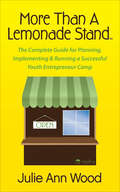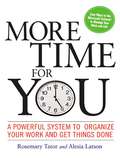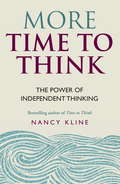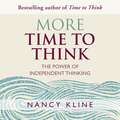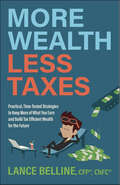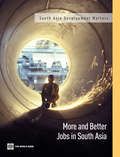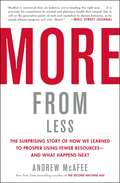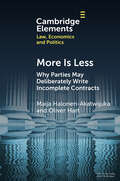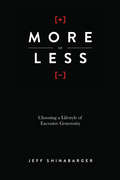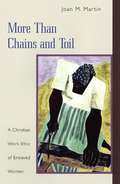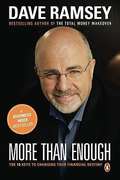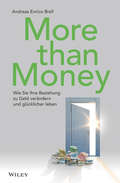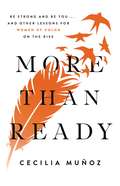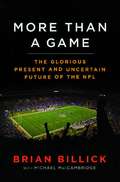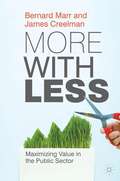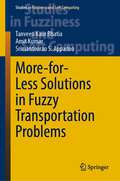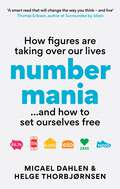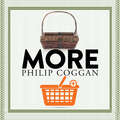- Table View
- List View
More Than a Lemonade Stand: The Complete Guide for Planning, Implementing & Running a Successful Youth Entrepreneur Camp
by Julie Ann WoodHelp the leaders of tomorrow get their start with this step-by-step guide to creating your own youth entrepreneur camp. Entrepreneurial skills are more in demand today than ever before. Often, the most successful entrepreneurs started honing their skills at a young age. Whether it was a lemonade stand or a newspaper route, they were learning fundamentals of business early in life. So what if we could guide more kids through these valuable lessons and put them on the path to success?More Than a Lemonade Stand provides the resources and tools you need to run a youth entrepreneur camp—from guidance in building your curriculum to educational activities you can incorporate into your program. With this easy-to-follow guide, you will learn how to lead young men and women through the exciting process of brainstorming, conceptualizing, and building a business from scratch.
More Than a Numbers Game
by King Thomas A.The world certainly suffers no shortage of accounting texts. The many out there help readers prepare, audit, interpret and explain corporate financial statements. What has been missing is a book offering context and discussion for divisive issues such as taxes, debt, options, and earnings volatility. King addresses the why of accounting instead of the how, providing practitioners and students with a highly readable history of U. S. corporate accounting. More Than a Numbers Game: A Brief History of Accounting was inspired by Arthur Levitt's landmark 1998 speech delivered at New York University. The Securities and Exchange Commission chairman described the too-little challenged custom of earnings management and presaged the breakdown in the US corporate accounting three years later. Somehow, over a one-hundred year period, accounting morphed from a tool used by American railroad managers to communicate with absent British investors into an enabler of corporate fraud. How this happened makes for a good business story. This book is not another description of accounting scandals. Instead it offers a history of ideas. Each chapter covers a controversial topic that emerged over the past century. Historical background and discussion of people involved give relevance to concepts discussed. The author shows how economics, finance, law and business customs contributed to accounting's development. Ideas presented come from a career spent working with accounting information.
More Time for You: A Powerful System to Organize Your Work and Get Things Done
by Rosemary Tator Alesia LATSONIn this step-by-step guide, authors Rosemary Tator and Alesia Latson unpack the things that lead people to feeling burnt out and unfulfilled in their lives and careers and offer a solution to getting more of the thing they really want--time for themselves! Employing a healthy mix of upbeat encouragements and get-to-it messages, they offer a proven, practical approach for prioritizing, achieving goals, reducing stress, and increasing your capacity to do what matters most. More Time for You does this by explaining how to take advantage of today’s most versatile and effective productivity enhancers--mobile devices, online tools, and calendar software--to get things done with ease and efficiency. You’ll learn how to make better, faster decisions based on your priorities; tame your inbox with easy and efficient email triage techniques; set up a calendar management and reminder system; handle distractions and interruptions; lose that nagging sense you are forgetting something; and maximize the benefits (and minimize the time sink) of social media. Complete with helpful illustrations and the authors’ actionable tips, More Time for You teaches readers how to get organized and make life happen--so they have more time to live it!
More Time to Think: The Power Of Independent Thinking
by Nancy KlineThe quality of everything we do depends on the quality of the thinking we do first. The leaders, professionals, parents and teachers who understand this are at the top of their fields and inspire some of the finest independent thinking in their environments. In More Time to Think, Nancy Kline shares ten effective ways to help people think for themselves with rigour, imagination, courage and grace. From learning that the mind works best in the presence of a question (so never be afraid to risk being wrong) and that a key factor in the quality of a person's thinking is how they are treated by the people with them while they are thinking, to the importance of appreciation and of facing what you have been denying, Nancy Kline shows how to create a successful Thinking Environment, whether for two people or a larger group.
More Time to Think: The power of independent thinking
by Nancy KlineThe follow-on to the bestselling Time to Think and Living with Time to Think.-'As we make sense of change in the 21st century, a deep understanding of the Thinking Environment should be part of every leadership development programme. It intrinsically values the contribution and humanity of each person, and drives team effectiveness. Its power is evident in higher quality relationships, as well as in shorter, smarter meetings. Bravo!' - Rosemary Grant, Statutory Director, Johnson & Johnson Medical UKThe quality of everything we do depends on the quality of the thinking we do first. The leaders, professionals, parents and teachers who understand this are at the top of their fields and inspire some of the finest independent thinking in their environments. In More Time to Think, Nancy Kline shares ten effective ways to help people think for themselves with rigour, imagination, courage and grace. From learning that the mind works best in the presence of a question (so never be afraid to risk being wrong) and that a key factor in the quality of a person's thinking is how they are treated by the people with them while they are thinking, to the importance of appreciation and of facing what you have been denying, Nancy Kline shows how to create a successful Thinking Environment, whether for two people or a larger group.-Praise for Time to Think'Do not be fooled by the simplicity of this process. It will unleash the power of your whole organisation.' - British Telecom'This process is not just a set of techniques. It's a way of being in the world.' - Shirley Edwards, Xerox CorporationPraise for Living with Time to Think'A beautiful book. Every page is a gift. Its compassionate wisdom illuminates your life and invites you to greater intimacy with your best and truest self. Nancy Kline writes to her god-daughters, and in so doing, offers timeless wisdom for us all.' - Mark Williams, bestselling co-author of Mindfulness
More Time to Think: The power of independent thinking
by Nancy KlineO2E CEO Warren Buffett spends 80% of his time thinking. Tim Armstrong, CEO of AOL, makes his executives devote 10% of their day, or 4 hours per week, to thinking. Bill Gates and Mark Zuckerberg are both well known for taking week-long 'thinking' retreats. In More Time to Think, Nancy Kline demonstrates that the quality of everything we do depends on the quality of the thinking we do first. The leaders, entrepreneurs and businesspeople who understand this are at the top of their fields and inspire some of the most successful and innovative practices and businesses in the world. In this audiobook, Nancy Kline shares ten effective ways to help people think innovatively, and with rigour. From learning that the mind works best in the presence of a question, and that a key factor in the quality of a person's thinking is how they are treated by the people around them, to the importance of appreciation, Nancy Kline shows how to create a successful Thinking Environment, whether for two people, a start-up, or a larger organisation.(p) 2017 Octopus Publishing Group'As we make sense of change in the 21st century, a deep understanding of the Thinking Environment should be part of every leadership development programme. It intrinsically values the contribution and humanity of each person, and drives team effectiveness. Its power is evident in higher quality relationships, as well as in shorter, smarter meetings.' Rosemary Grant, Statutory Director, Johnson & Johnson Medical UK'When you change the way you think, you change everything. In my work and my life the Thinking Environment has made all the difference.' Scott Farnsworth, President, SunBridge Inc., USA
More Wealth Without Risk
by Charles J. GivensCharles J. Givens' Wealth Without Risk has become a classic in the field of financial self-help books for one simple reason: it works. His safe, legal, and proven approach has already started millions of Americans on the road to accumulating wealth through better strategies for personal finance, tax reduction, and investment. More Wealth Without Risk keeps you at the cutting edge of practical, easy-to-use financial techniques. Givens delivers more than 350 low-risk financial strategies -- with special sections on protecting your credit and keeping the IRS's hands out of your wallet -- including how and why to: * Get your next raise totally tax-free * Make your vacations and trips tax-deductible * Get your retirement-plan money tax- and penalty-free before age 59 1/2 * Use high-powered, little-known strategies for getting out of debt and rebuilding credit * Get next year's tax refund this year And much, much more!
More Wealth, Less Taxes: Practical, Time-Tested Strategies to Keep More of What Your Earn and Build Tax Efficient Wealth for the Future
by Lance BellineWith unique and proven strategies for wealth accumulation, More Wealth, Less Taxes is designed for individuals seeking ways to pay lower taxes during their lifetime—especially during retirement.As a veteran in the financial services industry, Lance Belline knows how essential it is to save strategically and understand how the tax code works. More Wealth, Less Taxes is his guide for anyone who wants to go from “good” to “great” financially. Filled with real-life examples and stories of clients growing their wealth before —and after—they learned of the bucket strategy, Belline’s guide helps individuals gain confidence, peace of mind, and clarity of how they should save and invest. His approach is designed for anyone seeking to learn more about potential tax savings, wealth creation, and financial pitfalls to avoid.
More and Better Jobs in South Asia
by Pablo Gottret Reema Nayar Pradeep Mitra Gordon Betcherman Yue Man Lee Indhira Santos Mahesh Dahal Maheshwor ShresthaSouth Asia, which is home to more than 40 percent of the world s absolute poor, will contribute nearly 40 percent of the growth in the world s working age population over the next several decades. More and Better Jobs in South Asia attempts to answer three questions: # Has South Asia been creating an increasing number of jobs and better jobs? # What has determined the quality of job creation and what is the employment challenge going forward? # What demand- and supply-side bottlenecks need to be eased to meet South Asia s employment challenge in the face of intensifying demographic pressure? The region has created just under 800,000 jobs per month during the past two decades, a rate that broadly tracks growth in its working age population. The quality of jobs- measured in terms of higher wages for wage workers and lower poverty for the self-employed-has been improving, thanks to strong economic growth in some countries and massive out-migration and workers remittances elsewhere. But there is absolutely no room for complacency. South Asia will add between 1 million and 1.2 million new entrants to the labor force every month for the next two decades. Absorbing them into the labor force at rising levels of labor productivity is the crux of the employment challenge. Meeting the employment challenges calls for a reform agenda that cuts across sectors. It includes enhancing access to reliable electricity supply for firms in urban and rural settings, reducing corruption in dealings between firms and the state, facilitating access to land, strengthening transport links between town and country, focusing on better nutrition in early childhood, improving the quality of education to equip workers with relevant skills for the world of work, and protecting workers in both informal and formal sectors rather than protecting jobs for the few in the formal sector of the economy. Recognizing that South Asia is the most conflict-affected of the major regions in the world, the book also includes a chapter on how the challenges of job creation are magnified in such environments as well as some priorities going forward for labor market policies and programs. More and Better Jobs will be of interest to policy makers and their advisers, not only in South Asia but also in other parts of the world where creating better jobs is a significant challenge, as well as to the international development community and students of economics.
More for Less: The Complex Adaptive Leader
by Nick ObolenskyMost leadership assumptions are based on a deterministic view of the world. If you do X you should get Y, process can be employed for most things, and more complicated problems can be analysed to enable better decisions. Whilst these approaches suit the Simple and the Complicated, they do not work so well for the Complex. The Complex needs a different approach the core of which is to enable the organisation being led to be agile and self-organising. More for Less introduces a new paradigm for leadership, Leadership 4.0. Based on his previous book, Complex Adaptive Leadership, Nick Obolensky has created a simple and step by step approach to Leadership 4.0 whilst challenging and questioning the reader to be more effective and less busy. This book is an essential tool for the busy leader and manager and will appeal to practitioners wishing to improve their leadership effectiveness. It will also appeal to students and researchers in the field of leadership.
More from Less: The Surprising Story of How We Learned to Prosper Using Fewer Resources—and What Happens Next
by Andrew McAfeeFrom the coauthor of the New York Times bestseller The Second Machine Age, a compelling argument—masterfully researched and brilliantly articulated—that we have at last learned how to increase human prosperity while treading more lightly on our planet. Throughout history, the only way for humanity to grow was by degrading the Earth: chopping down forests, fouling the air and water, and endlessly digging out resources. Since the first Earth Day in 1970, the reigning argument has been that taking better care of the planet means radically changing course: reducing our consumption, tightening our belts, learning to share and reuse, restraining growth. Is that argument correct? Absolutely not. In More from Less, McAfee argues that to solve our ecological problems we don’t need to make radical changes. Instead, we need to do more of what we’re already doing: growing technologically sophisticated market-based economies around the world. How can he possibly make this claim? Because of the evidence. America—a large, high-tech country that accounts for about 25% of the global economy—is now generally using less of most resources year after year, even as its economy and population continue to grow. What’s more, the US is polluting the air and water less, emitting fewer greenhouse gases, and replenishing endangered animal populations. And, as McAfee shows, America is not alone. Other countries are also transforming themselves in fundamental ways. What has made this turnabout possible? One thing, primarily: the collaboration between technology and capitalism, although good governance and public awareness have also been critical. McAfee does warn of issues that haven’t been solved, like global warming, overfishing, and communities left behind as capitalism and tech progress race forward. But overall, More from Less is a revelatory, paradigm-shifting account of how we’ve stumbled into an unexpectedly better balance with nature—one that holds out the promise of more abundant and greener centuries ahead.
More is Less: Why Parties May Deliberately Write Incomplete Contracts (Elements in Law, Economics and Politics)
by Maija Halonen-Akatwijuka Oliver HartWhy are contracts incomplete? Transaction costs and bounded rationality cannot be a total explanation since states of the world are often describable, foreseeable, and yet are not mentioned in a contract. Asymmetric information theories also have limitations. We offer an explanation based on 'contracts as reference points'. Including a contingency of the form, 'The buyer will require a good in event E', has a benefit and a cost. The benefit is that if E occurs there is less to argue about; the cost is that the additional reference point provided by the outcome in E can hinder (re)negotiation in states outside E. We show that if parties agree about a reasonable division of surplus, an incomplete contract is strictly superior to a contingent contract. If parties have different views about the division of surplus, an incomplete contract can be superior if including a contingency would lead to divergent reference points.
More or Less
by Jeff ShinabargerIn More or Less, Jeff Shinabarger calls readers to create their own social experiments to answer the question, "What is enough?" It all started with one idea: What would happen if we created a culture in which we gave away whatever was more than enough for us? How would our habits change if we shed the excess of money, clutter, and food in our lives? In More or Less, readers will learn how to draw a line of "enough" in their consumer choices, how to see generosity as a chance to experience freedom in a greedy world, and how to make small changes now that will help others forever. As Shinabarger reminds them, defining "enough" is more than a responsibility--it is an opportunity to give hope. With a foreword by Bob Goff.
More than Chains and Toil: A Christian Work Ethic of Enslaved Women
by Joan M. MartinIn More than Chains and Toil, Joan Martin explores the experiences of enslaved women and the realities of their social world to uncover the interrelationships among moral agency, work, and human meaning. She then reflects ethically on the implications such a distinct perspective on labor might have for women in contemporary African American communities and for broader discussions about the meaning of work in American society.
More than Enough: The Ten Keys to Changing Your Financial Destiny
by Dave RamseyIn his first bestseller, Financial Peace, Dave Ramsey taught us how to eliminate debt from our lives. Now in More Than Enough, he gives us the keys to building wealth while also creating a successful, united family. Drawing from his years of work with thousands of families and corporate employees, Ramsey presents the ten keys that guarantee family and financial peace, including: values, goals, patience, discipline, and giving back to one's community. Using these essential steps anyone can create prosperity, live debt-free, and achieve marital bliss around the issue of finances. Filled with stories of couples, single men and women, children, and single parents, More Than Enough will show you: How to create a budget that fits your income and creates wealth What finances and romance have to do with one another What role values play in your financial life How to retire wealthy in every way And much, much moreResonating with Ramsey's down-home, folksy voice, heartwarming case histories, inspiring insights, quotations from the Bible, and exercises, quizzes, and worksheets, More Than Enough provides an inspiring wealth-building guide and a life-changing blueprint for a vital family dynamic.
More than Money: Wie Sie Ihre Beziehung zu Geld verändern und glücklicher leben
by Andreas Enrico BrellDas Thema Geld füllt bereits zahlreiche Bibliotheken. Angesichts der aktuellen weltpolitischen und auch wirtschaftlichen Geschehnisse steigen die Ängste und Unsicherheiten der Menschen betreffend ihre finanzielle Zukunft. Sie sorgen sich um ihre Jobs, ihre Altersversorgung, den Euro, den Fortbestand der Finanzmärkte, machen sich Gedanken, was ihre diversen Versicherungen später noch wert sein mögen, ob sie ihren gewohnten Lebensstandard halten können. Viele malen sich diverse geistige Katastrophenszenarien aus und erstarren in von Sorge getriebenen Gedankenmustern. Andere wiederum verfügen über ausreichende Mittel, sind aber in der Tretmühle des Geldverdienens dermaßen heftig verhaftet und verstrickt, dass sie keine Zeit mehr haben, richtig und bewusst zu leben. Kurz gesagt: Gelassenheit und ein entspannter Umgang mit Geld sehen anders aus. Es ist an der Zeit für ein neues Denken in all diesen Bereichen, vor allem zum Thema Geld. "More than money" basiert auf einem ungewöhnlichen Ansatz für die brisante Thematik Geld. Es zeigt nicht, wie man Millionär wird. Es enthält keine Investment-Tipps oder Börsenstrategien. Und es zeigt auch nicht, wie Haushaltsbücher effizient geführt werden. "More than money" schildert den individuellen und sicher nicht immer einfachen Weg, wie wir alle einen wirklich entspannten Umgang mit Geld erreichen können - völlig unabhängig davon, wie viel Geld wir tatsächlich im Moment besitzen. Andreas Enrico Brell beschreibt in diesem Buch den individuellen Weg zu mehr Geld und gleichzeitig zu mehr Zeit, zu mehr Lebensqualität, zu besseren Beziehungen, erhöhter Gelassenheit und vor allem zu einer ganzheitlichen Erfüllung und Glück im Leben. Hierzu bedarf es einer neuen Einstellung, dem neuen Denken zu und über Geld. Er ist davon überzeugt, dass Geldnot immer nur das äußere Anzeichen eines viel tiefer liegenden Verhaltensmusters darstellt. Wer es schafft, diese Verhaltensmuster zu ändern, ändert damit automatisch auch den persönlichen Umgang mit der Materie Geld. Der Leser lernt, wie er mit dem wichtigen "Gut" Geld - vor allem auch gedanklich - maßvoll, optimal, entspannt aber doch konsequent und zielorientiert umgeht. Dieses Buch liefert allen, die mit Geld zu tun haben - also uns allen - nachweislich pragmatisch wirksame, vom Autor in seiner langjährigen Praxis als Finanzmakler erprobte Einsichten und Ansätze, langfristig in Bezug auf die Materie Geld wirklich sorgfältig, verlässlich, aber gleichzeitig auch entspannt und gelassen zu denken und zu agieren und dabei auch alle anderen Lebensbereiche erfüllend auszubalancieren. Es geht im Wesentlichen um diese fünf Lebensbereiche: Zeit, Gesundheit, Beruf, Beziehungen und eben Finanzen. Das Buch behandelt diese Bereiche aus der Sicht von Geld und zeigt klar auf, dass erst dann, wenn alle diese Bereiche in Balance sind, ein wirklich entspanntes Leben entsteht. Andreas Enrico Brell zeigt, dass dies nur funktioniert, wenn wir auch unsere Gedanken und Gefühle, persönlichen Werte und den eigentlichen Sinn des Lebens in den Vordergrund dieses neuen Denkens stellen. Mit zahlreichen humorvollen Beispielen aus seiner beruflichen Praxis und aus seinem eigenen Leben sorgt Andreas Enrico Brell zudem für echtes Lesevergnügen.
More than Ready: Be Strong and Be You . . . and Other Lessons for Women of Color on the Rise
by Cecilia MunozAdvice and inspiration for women of color seeking new heights of influence, from the "incredible" top Latinx advisor to President Obama (Jennifer Palmieri, author of Dear Madam President).Women of color today are contributing to an unprecedented wave of "firsts"-whether they are the first in a family to attend college, the first to serve as CEO of a Fortune 500 company, or the first in public office, women of color are reaching new heights of influence. Cecilia Muñoz was a first, too, and she knows what it means to make her way without exemplars to follow. The first Latinx to lead the White House Domestic Policy Council, Muñoz draws lessons from the challenges she faced as the senior Hispanic person in the Obama White House and as a longtime powerful voice in the Civil Rights Movement. She shares her insights, along with those of some extraordinary women of color she met along the way, as an offering of inspiration to women of color who are no longer willing to be invisible or left behind. Full of invaluable lessons about working through fear, facing down detractors, and leading with kindness, Muñoz provides the thoughtful insight and tactical tools women of color need to be successful-without compromising who they are.
More than Revenue
by Eduardo Lora Ana Corbacho Vicente Fretes CibilsThis exciting new volume provides an up-to-date overview of the current state of taxation in the Latin America and Caribbean (LAC) region, its main reform needs, and possible reform strategies that take into account the likely economic, institutional, and political constraints on the reform process.
More than a Game
by Michael Maccambridge Brian BillickToday's National Football League is more successful, more exciting, and more popular than ever. But the game in the twenty-first century is also ruled by a constant quest for more money. Super Bowl-winning head coach Brian Billick's More Than a Game examines how the relentless competition off the field affects the game on the field, and what it means for the future of America's most popular sport. One of the NFL's most successful leaders, Billick coached the Baltimore Ravens from 1999 to 2007, leading his team to victory in Super Bowl XXXV in 2001. With nearly two decades in the league, and now a Fox game analyst and NFL Network contributor, Billick has experienced the league's enormous pressure to win as well as seen what happens to those who don't. Following the 2007 season, he took a step back from the coaching life and decided to spend a season examining the game he loved so much from other perspectives. Collaborating with Michael MacCambridge (whose book America's Game is regarded as the definitive modern history of the NFL), he delved into the NFL from every possible angle, spending time with people at every level of the game. More Than a Game explains how the spectacle that dominates fall weekends in America works, and why it has served all of football's interest groups -- owners players, and fans alike -- so well over the years. We get a glimpse of the changing profile and increased influence of the league's owners. We come to better understand the pressure that players are under to perform for their team and for themselves and their future contracts. We see the challenge facing NFL commissioner Roger Goodell, who must balance the concerns of owners, players, sponsors, the league's television network "partners," and the fans, whose devotion and dollars make the entire enterprise possible. Along the way, we see how the financial forces are exerting themselves on every level, working their way into the essence of the game itself. Billick takes the measure of new offensive and defensive strategies, explains refined scouting and team-building methods, and focuses on the elusive quest for the franchise quarterback that can make or break careers. Packed with the privileged knowledge that comes from a true NFL insider, More Than a Game is more than a look inside the complex system that is pro football. It's an attempt to understand why the game is so compelling, and what it will take to keep it that way. Complete with important developments in the 2009 off-season, the book stands as an absolute must-read for NFL fans.
More with Less
by Bernard Marr James CreelmanPublic sector organizations are about to enter one of the most challenging environments they have ever had to face as they bear much of the cost of the credit crunch. This timely book shows public sector leaders what they need to understand in order to be able to cope with these challenges.
More-for-Less Solutions in Fuzzy Transportation Problems (Studies in Fuzziness and Soft Computing #426)
by Amit Kumar Tanveen Kaur Bhatia Srimantoorao S. AppadooThis book describes a set of methods for finding more-for-less solutions of various kind of fuzzy transportation problems. Inspired by more-for-less approaches to the basic transportation problem initiated by Abraham Charnes and his collaborators during 1960s and 1970s, this book describes new methods developed by the authors to solve different types of problems, including symmetric balanced fuzzy transportation problems, symmetric intuitionistic fuzzy transportation problems with mixed constraints, and symmetric intuitionistic fuzzy linear fractional transportation problems with mixed constraints. It offers extensive details on their applications to some representative problems, and discusses some future research directions
More. Numbers. Every. Day.: How Figures Are Taking Over Our Lives – And Why It's Time to Set Ourselves Free
by Micael Dahlen Helge ThorbjørnsenHow many steps have you done today?How many emails answered?How much money have you spent this week And how many hours have you slept?Welcome to the numberdemic, where a deluge of figures, stats and data manipulate your every move. From the way you work, date and exercise to the products you buy and the news you read, numbers have worked their way into every part of our lives. But is life better this way? How are all of those numbers affecting us?With fascinating, sometimes frightening and sometimes shrewdly funny research, behavioural economists Micael Dahlen and Helge Thorbjørnsen explain why we're so attached to numbers and how we can free ourselves from their tyranny. Along the way, you'll learn why viral videos, however inaccurate, become more convincing with every view; how numbers can affect the way we physically age, if we let them; why the more films you rate the less impressive you'll find them and how numbers that 'anchor' themselves in your brain can affect the size of your mortgage - plus much more.Sharp, insightful and totally engaging, MORE. NUMBERS. EVERY. DAY. is your vaccination against a world obsessed with numbers.'An entertaining and thought-provoking antidote to the tyranny of numbers in the modern world. By looking at the psychology of how we are tricked, goaded and often crushed by endless quantification, the authors present a winning case for weaning ourselves off number-dependence.'-Alex Bellos, author of Can You Solve My Problems?'Everybody should read this book. A smart and insightful read that will totally change the way you think - and live.'-Thomas Erikson, author of Sunday Times bestseller Surrounded By Idiots'Written in lucid, skillfully translated prose that puts the science into philosophical perspective, this shines a fascinating light on the modern-day obsession with numerical quantity over quality.' -Publishers Weekly'In 31,234 words Dahlen and Thorbjørnsen cast their four critical, and at times whimsical, eyes at our numbered existences revealing that consuming too much 'pi' might be bad for our health.'-Professor Scott Page, author of The Model Thinker
More: A History of the World Economy from the Iron Age to the Information Age
by Philip CogganA sweeping history that tracks the development of trade and industry across the world, from Ancient Rome to today. From the development of international trade fairs in the twelfth century to the innovations made in China, India, and the Arab world, it turns out that historical economies were much more sophisticated that we might imagine, tied together by webs of credit and financial instruments much like our modern economy.Here, Philip Coggan takes us from the ancient mountains of North Wales through Grand Central station and the great civilizations of Mesopotamia to the factories of Malaysia, showing how changes in agriculture, finance, technology, work, and demographics have driven the progress of human civilization. It's the story of how trade became broader and deeper over thousands of years; how governments have influenced economies, for good or ill; and how societies have repeatedly tried to tame, and harness, finance. More shows how, at every step of our long journey, it was the connection between people that resulted in more trade, more specialization, more freedom, and ultimately, more prosperity.
More: The 10,000-Year Rise of the World Economy
by Philip CogganEconomics may seem like a modern field, but its object of study is ancient. Resources have been exchanged and distributed since the dawn of history, and the economies that arose from those transactions were more complex than you might expect. In this panorama of the development of trade and industry, Economist columnist Philip Coggan tracks the development of the world economy starting with the first obsidianblades that made their way from Turkey to what is now the Iran-Iraq border 7,000 years before Christ, and ending with the Sino-American trade war that we are in right now.Taking the history in great strides, More illustrates broad changes by examining details such as the design of the standard medieval cottage, the development in the 12th century of great international trade fairs under the patronage of the Counts of Champagne and Brie, and the stranglehold that Paris's three belt-buckle-making guilds exercised over innovation in the field of holding trousers. Along the way it reveals that historical economies were far more sophisticated than we might imagine - tied together by webs of credit and financial instruments much like the modern economy.Between the chapters making up the grand historical sweep Coggan dives into different facets of the economic world - providing potted histories of migration, finance, energy, and agriculture. In total, he shows how technologies and social systems spread, crosspollinated and created the possibility of new waves of development. And he shows how, at every step of our long journey, it was connections between people - allowing more trade, more specialisation, more ideas and more freedom - that created the conditions of prosperity.
